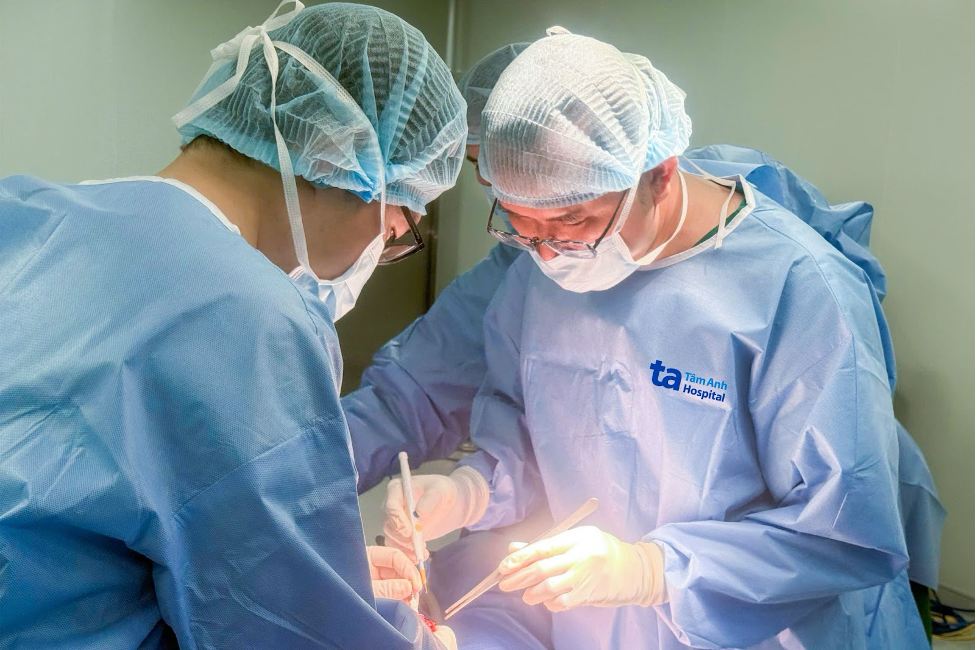Khanh had experienced a right inguinal hernia in his youth, where his intestine would protrude during strenuous activity and then retract back into his abdomen. This time, the protruding intestine became trapped in his scrotum, causing intense abdominal pain and high fever. He sought treatment at Tam Anh General Hospital in TP HCM, where he was diagnosed with a strangulated hernia.
Doctor Ngo Hoang Kien Tam, from the Center for Endoscopy and Minimally Invasive Digestive Surgery, explained that a strangulated hernia occurs when a portion of an organ, usually the intestine, becomes trapped in the hernia sac and cannot return to the abdominal cavity. This condition requires prompt treatment within 6 hours to prevent intestinal swelling, which can lead to a lack of blood supply, causing necrosis and infection. However, Khanh arrived at the hospital late, and a portion of his small intestine had already become necrotic and turned black.
 |
Doctor Tam (right) performing Khanh's surgery. Photo: *Tam Anh General Hospital* |
Khanh's herniated intestine was constricted at the neck of the hernia sac (the narrowest part), causing the necrosis. The surgical team freed the trapped intestine and removed the 80 cm section (the average small intestine is 6 m long) that had become twisted, constricted, and necrotic. Doctor Tam then performed a Bassini herniorrhaphy, using Khanh's own tissue to reconstruct the weakened posterior wall of the inguinal canal that had caused the hernia.
"We used Khanh’s own tissue for the repair to prevent severe infection, instead of reinforcing the hernia with a specialized synthetic mesh, which is the typical procedure," Doctor Tam explained.
Following the surgery, Khanh's health gradually improved. His pain subsided completely, and he was able to walk and eat normally after two days. He was discharged after 5 days.
 |
Khanh undergoing a check-up before being discharged. Photo: *Tam Anh General Hospital* |
Depending on the hernia, doctors may perform open surgery or laparoscopic surgery. Laparoscopic surgery is a minimally invasive procedure, resulting in less pain and faster recovery for the patient. During laparoscopy, doctors use specialized synthetic mesh to reinforce the hernia opening, strengthening the abdominal wall, supporting weakened abdominal muscles, distributing force more evenly, and reducing the risk of recurrence.
Inguinal hernias can be caused by various factors, including a congenital weakness in the abdominal wall, age, genetics, increased intra-abdominal pressure due to chronic coughing, heavy lifting, being overweight, obesity, and pregnancy.
Doctor Tam warned that strangulated inguinal hernias are a dangerous complication. If you experience symptoms such as a bulge in the groin area that increases in size when standing for long periods, coughing, accompanied by pain, burning, heaviness or fullness in the groin, or scrotal swelling in men, seek medical attention for appropriate treatment.
Quyen Phan
| Readers can submit questions about digestive diseases here for doctors to answer. |












